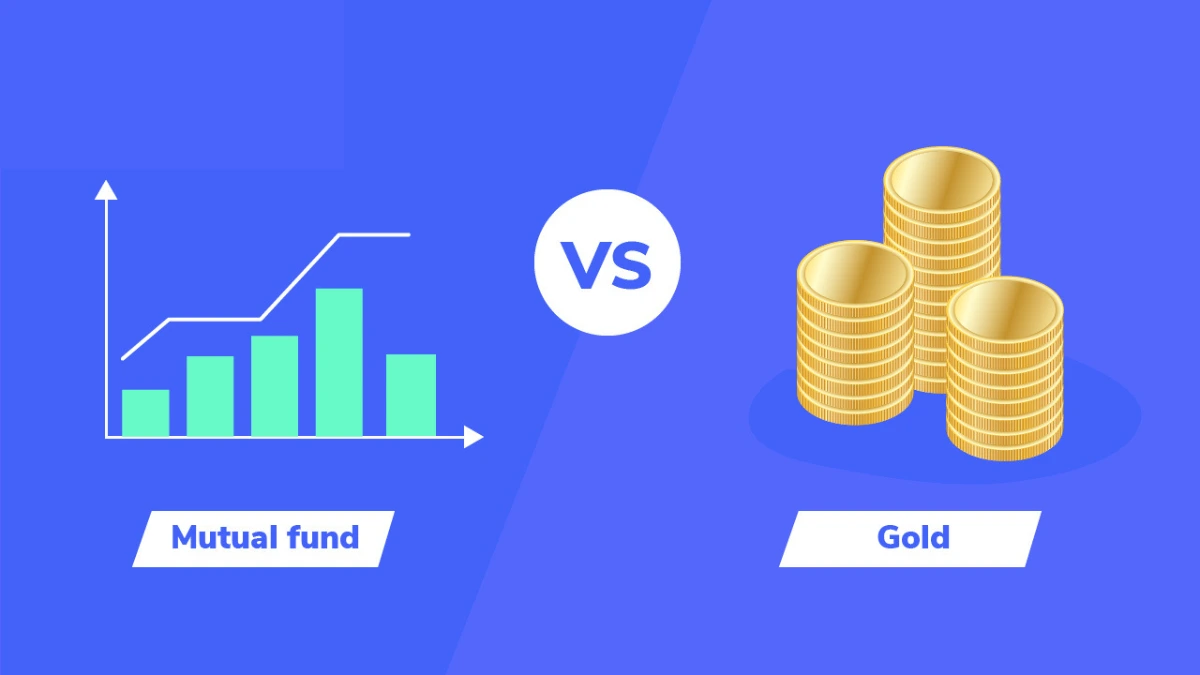Investing has become a crucial part of wealth creation in today’s economy. In India, two of the most popular investment options are gold and mutual funds. Both are widely trusted, but they serve different purposes and offer different returns. Whether you’re a seasoned investor or just starting, the question remains: Which is the better investment option – gold vs mutual funds?
In this detailed guide, we’ll help you navigate the intricacies of both options, examining their risks, returns, liquidity, and tax benefits, so you can make an informed decision.
Table of Contents
Understanding the Basics of Gold and Mutual Fund Investments
Before comparing the two investment options, it’s essential to understand what each one represents and how it functions in the broader market.
What is Gold Investment?
Gold has been a cornerstone of wealth storage for centuries, especially in India. Traditionally, people have invested in physical gold in the form of jewelry, coins, or bars, but today, there are modern alternatives like Gold ETFs and Sovereign Gold Bonds (SGBs) that offer the benefits of gold without the hassle of storage or the risk of theft.

- Physical Gold: This is the most traditional form of gold investment, often tied to cultural practices in India. While it’s tangible, there are downsides like storage costs, fear of theft, and making charges associated with jewelry. Physical gold’s liquidity is high, but selling physical gold can sometimes involve a loss due to these additional costs.
- Gold ETFs (Exchange-Traded Funds): These are financial products that allow you to invest in gold without physically owning it. They trade on the stock exchange, offering better liquidity and ease of purchase and sale. Moreover, Gold ETFs come with lower transaction costs compared to physical gold.
- Sovereign Gold Bonds (SGBs): These bonds are issued by the Government of India and are considered one of the safest options for gold investment. They provide annual interest and eliminate storage and insurance costs. However, they come with a lock-in period, which limits liquidity.
What are Mutual Funds?
Mutual funds are financial instruments that pool money from various investors to invest in stocks, bonds, or other securities. They are managed by professional fund managers, which makes them an attractive option for those who lack the time or expertise to invest directly in the stock market.

There are different types of mutual funds available, depending on your risk appetite and financial goals:
- Equity Mutual Funds: These funds invest in stocks and are designed for high growth potential. They are volatile and risky in the short term but have the potential for significant returns over the long run.
- Debt Mutual Funds: These funds invest in government and corporate bonds, providing a safer, lower-risk investment option. The returns are more predictable but generally lower than equity funds.
- Hybrid Mutual Funds: As the name suggests, these funds invest in a mix of equity and debt, offering a balanced approach to risk and return.
Gold Vs Mutual Funds – A Detailed Comparison
Let’s dive into a detailed comparison of gold and mutual funds based on crucial factors like risk, returns, liquidity, and tax benefits.
Risk Factor
Every investment comes with a degree of risk, and the level of risk you’re willing to take plays a significant role in choosing between gold and mutual funds.
- Gold: Historically, gold has been seen as a low-risk investment. It’s considered a safe haven during economic downturns or periods of high inflation. However, gold prices can be volatile in the short term, especially when driven by international market fluctuations or geopolitical events.
- Mutual Funds: The risk in mutual funds depends largely on the type of fund. Equity mutual funds are high-risk but have the potential for high returns. On the other hand, debt mutual funds carry lower risk but provide more stable returns. Hybrid mutual funds offer a balanced approach, allowing investors to mitigate some of the risks associated with stock market volatility.
Returns on Investment
One of the most significant factors to consider when choosing an investment is the potential return. Both gold and mutual funds offer returns, but they vary significantly in terms of timeframe and magnitude.
- Gold: Over the long term, gold has historically provided modest but stable returns. However, it does not generate dividends or interest, unlike other asset classes like stocks or bonds. Gold’s value appreciates primarily due to supply and demand, geopolitical events, and economic crises. While gold tends to perform well during times of inflation, it does not offer the compounding benefits that mutual funds provide.
- Mutual Funds: Mutual funds, especially equity mutual funds, are designed to generate long-term wealth. Returns from mutual funds can significantly outpace inflation, especially over a long investment horizon. The compounding effect of mutual funds—where profits are reinvested—can lead to exponential growth. Debt mutual funds, while offering lower returns, are more stable and offer steady income through interest payments.
Liquidity
Liquidity refers to how easily an asset can be converted into cash without affecting its market price. Both gold and mutual funds offer liquidity, but there are differences.
- Gold: Physical gold can be easily sold in the market, although you may face losses due to making charges or transaction fees. Gold ETFs offer much better liquidity, as they can be bought and sold on the stock market just like shares. SGBs, however, come with a lock-in period, which limits liquidity.
- Mutual Funds: Mutual funds, especially open-ended funds, are highly liquid. Investors can redeem their units at the prevailing NAV (Net Asset Value), although some funds may impose an exit load if redeemed within a specified period. However, mutual funds typically offer more straightforward liquidity compared to physical gold.
Tax Benefits
Taxes play a crucial role in deciding which investment avenue to pursue. Let’s examine the tax implications of investing in gold and mutual funds.
- Gold: Investing in physical gold does not offer any tax benefits. However, if you invest in Sovereign Gold Bonds (SGBs), you can enjoy tax-free capital gains if you hold the bonds until maturity. Additionally, interest earned on SGBs is taxable under your income.
- Mutual Funds: Mutual funds offer tax advantages, especially with schemes like ELSS (Equity-Linked Savings Scheme), which qualifies for deductions under Section 80C of the Income Tax Act. Long-term capital gains from equity mutual funds are taxed at 10% (if gains exceed ₹1 lakh in a financial year), whereas short-term capital gains are taxed at 15%. Debt mutual funds are taxed differently, with long-term capital gains taxed at 20% with indexation benefits.
Inflation Hedge
One of the reasons investors choose gold is because it is seen as a hedge against inflation. However, mutual funds can also provide protection against inflation.
- Gold: Historically, gold prices tend to rise during periods of high inflation, making it an excellent inflation hedge. When the purchasing power of currency declines, the value of gold usually increases, preserving the investor’s wealth.
- Mutual Funds: Mutual funds, especially equity funds, have the potential to outpace inflation over the long term. While short-term market volatility can affect the value of mutual funds, long-term investments in equity funds typically provide returns that exceed inflation, thus generating wealth in real terms.
You may also Read: Understanding the Effect of GDP on Inflation in India
You may also Read: Finance Minister Reviews Capex Plan of Housing and Urban Affairs Ministry
Conclusion: Which Should You Choose – Gold or Mutual Funds?
Ultimately, the choice between gold and mutual funds depends on your investment objectives, risk tolerance, and financial goals. Gold is a safer, more stable option that works well as a hedge against inflation and a store of value. However, it may not provide the same wealth-building potential as mutual funds, especially equity funds, which offer the opportunity for high returns and the benefits of compounding.
For most investors, a balanced portfolio that includes both gold and mutual funds can provide the best of both worlds—stability and growth. By diversifying your investments, you can protect yourself from market volatility while taking advantage of the long-term growth potential that mutual funds offer.
Whether you choose gold, mutual funds, or a combination of both, it’s essential to align your investments with your financial goals, risk appetite, and investment horizon.
FAQs Related to Gold Vs Mutual Funds
Is Gold Better than Mutual Funds?
Gold is safer with stable returns, while mutual funds, especially equity funds, can offer higher returns but come with higher risks. The choice depends on your goals: stability (gold) vs. growth (mutual funds).
Is it Better to Buy Gold or Invest in Stocks?
Gold offers stability and protection against inflation, while stocks offer higher growth potential but are riskier. Stocks are better for long-term growth, whereas gold is ideal for wealth preservation.
Which Investment is Best, Gold or SIP Investment?
SIPs in equity mutual funds provide better long-term returns due to compounding. Gold is stable but offers lower returns. SIPs are typically better for wealth creation, while gold adds stability.
Gold vs Mutual Fund Pros and Cons
Gold: Safe, stable, inflation hedge, but low returns.
Mutual Funds: Higher returns, tax benefits, but more risk and volatility.
Digital Gold vs Mutual Fund
Digital gold is stable and easy to access, but mutual funds offer higher returns over time, especially through SIPs in equities.

